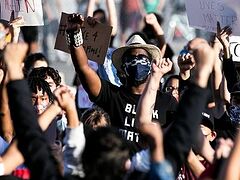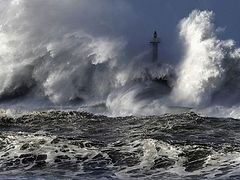 Screenshot from Quiet Flows the Don movie (2015)
Screenshot from Quiet Flows the Don movie (2015)
Колы прапор в'эться, про голову нэйдэться1
Ukrainian proverb
Everyone shooting, believing its fair
Wielding a sabre, a sword or a gun
Justice here and justice there
No one can hide, there’s nowhere to run
Everyone’s killed—that’s how it ends
This is Armageddon, my friends
Dalia Truskinovskaya
The events that have taken place since 2014, including the tragedy in Ukraine, Covid-related frenzy, and unrest in Belarus, have exposed the weakness of post-Soviet society. Consumerism, traditionally viewed as the root of all evil, apparently wasn’t the greatest temptation for the society in general and even for the people of faith. The greatest temptation was hatred. Hatred and aggressiveness have become the norm – “Beat them, you’re in the right!”
People are full of aggression, and their aggression is looking for a way to manifest and justify itself. You won’t beat up a neighbor you dislike or run him over with your car, because you know that this is a crime punishable by law and that people would disapprove. It is different though, if you’re at a rally and your neighbor is wearing a police uniform, for now it seems okay to attack him or run him over. Similarly, you wouldn’t publish a post on Instagram calling for violence against a boss you don’t like, yet personal data and addresses of law enforcement officers (and even their family members!) have been posted online specifically for that purpose.
In the 90s, I was a young student, but unlike most of my peers, I wasn’t too keen on attending rallies and setting up barricades. When somebody tried to talk me into going to the barricades, I always said that I knew classic literature too well. Take Quiet Flows the Don, for example. Every page of this book contains descriptions of killing captives, executing hostages, and slaughtering civilians by either the Red or White army. Throughout the narrative, the protagonist Grigoriy Melekhov, a Cossack lost in the chaos of the revolution, saves the hostages, laments the death of his beloved brother shot by the Red Army, tries unsuccessfully to stand up for the captured esaul2 Chernetsov, and slashes captive sailors with his sabre only to burst out crying right away, disgusted by what he had done. Reading the book, you can’t help but wonder why the adversaries, although having opposing views and different goals, still act the same!
Quiet Flows The Don became my vaccine against the “Beat them, you’re in the right!” mentality.
Quiet Flows The Don became my vaccine against the “Beat them, you’re in the right” mentality. Reading this book, I understood that the temptation of having the right to hate somebody is destructive. Later, I would see many examples confirming that my understanding was correct. Hatred is not simply a feeling or emotion; it is a special state of one’s damaged conscience that allows one to dehumanize other people and treat them accordingly.
Let me refer you to another literary classic, Hugo’s Les Misérables. Jean Valjean spent nineteen years in prison for stealing a loaf of bread. Naturally, he had his reasons to hate society, and this damaged his conscience so much that he became capable of hurting people who were kind to him (by stealing from a man who gave him shelter, for example). This is what hatred can do. And it always starts with righteous anger.
The thing is, it is not a matter of who is in the right or who is in the wrong. You can in fact be right, but if you vent your anger, it imperceptibly turns into rage that is subsequently transformed into hatred. I remember the fire in Odessa in 2014 very well (I doubt that I can ever forget it). People who were my good acquaintances and seemed so nice and refined, were caught in some kind of moral lunacy or, for lack of other words, demonic possession. They kept on chanting “vatnik” and “kolorad”3, words that first and foremost are offensive to those who utter them; in an obscene exultation they celebrated the deaths of their fellow countrymen and posted hateful comments in social networks. And they thought that they were fine.
Hatred intoxicates people
It would be naïve to think that we are not like that and that we would never… You never know. Hatred intoxicates people. That is why all attempts to get justice only bring more evil into the world. All revolutionaries yearn for justice and in the beginning they are all romantic activists with lofty ideals, yet they end up as murderers. Such is our human justice; we are short-sighted and vindictive. Our mores are based on mercilessness, hypocrisy, double standards and pretense that we are not as the other men are (Luke, 18:11).
“Let us take cruelty and violence as an example of evil. Cruelty always wounds the soul or flesh of people. This is where evil and goodness or innocence collide… People may feel hatred toward each other. The victim may feel hatred towards the tormentor and try to turn the tormentor into victim, or turn the whole situation into a competition of hatreds… But this will have no effect on evil or suffering, because if you reverse the situation, if the victim becomes the tormentor, it would simply mean that there’s twice as much evil…”4
According to Met. Anthony of Sourozh, suffering for something that you were wrongfully accused of gives you the right and opportunity to be magnanimous and intercede with God for the wrongdoer. This is not wishful thinking, but the words of a man who fought in World War II as an army medical officer and a member of the French Resistance. The future Metropolitan had to alleviate the death throes of the wounded Nazi soldiers who had fought against him. Rather than following the narrow human morality, he was guided by the super-ethics of Christianity, the only weapon that can help you win spiritual victories.
Yearning for justice leads to pointless “competition of hatreds”, but God showed us the way out of this dead end.
At the end of the novel, Grigoriy Melekhov throws his rifle into the Don. Despite the execution of his brother, the death of a woman he loved, and persecution by a former friend who became a fanatical Bolshevik, Melekhov overcame the temptation of hatred.
I don’t care what some ignorant troll types shout in caps lock, I care what the Gospel says. Yearning for justice leads to pointless and destructive “competition of hatreds”, but God shows us the way out of this dead end.
Ye have heard that it hath been said, Thou shalt love thy neighbor, and hate thine enemy. But I say unto you, Love your enemies, bless them that curse you, do good to them that hate you, and pray for them which despitefully use you, and persecute you (Matt. 5:43-44).




